Thank you for taking the time to speak to us today, for those who don’t know you could you tell us a little about yourself?
First of all, thanks for the interview!
I'm Guillaume Veer, a Belgian guy living in France. Before working as a narrative designer, I have been modding for approximately 6 years here on the Nexus. I first tried my hand with a handful of small mods before moving to a larger project called "Autumn Leaves" - which got me enough coverage to transmogrify my sad, sad crappy career into the one of a narrative designer.
The culmination of your modding exploits was the release of Autumn Leaves for Fallout New Vegas. It’s a complex weaving murder mystery that was so well received, even Bethesda themselves may have taken inspiration from it. Looking back at it now, what are your thoughts about that project?
It was a four-years-long exercise in tightrope-walking. Aside from a few voice actors and beta testers, I made Autumn Leaves alone, which left me with a truckload of work and tough calls to make.
Setting a right scope for Autumn Leaves was the first and best decision I made, in retrospect. (And I beg other modders to do the same, lest they abandon their most promising work.) I wanted Autumn Leaves to keep the player entertained throughout the whole story and I didn't want to waste my energy chasing too many rabbits - so I kept the Autumn Leaves' scope rather small. Keep the intrigue to one secluded place: a forsaken, centuries-old library with an awful lot of secrets to hide - no fighting, no dungeons, no tedious filler fetch-quests. Only quirky dialogues, careful investigations and environmental story-telling.
I wanted the players to be able to solve every quest in different ways, reward them for doing things their way. More than anything, giving them a space for self-contemplation. I think that narrative video games are good for one thing in particular, and it's inviting the players to know themselves better, by allowing them to make choice and witness their consequences. (...and if possible, making them struggle with their emotions at some point.)
I wanted to focus on that aspect and that aspect alone. Keeping the scope tight was what allowed me to do it, even if it took me pretty much all of my time of after-work hours.
(With the exception of quality family time - no one should ever sacrifice that.)
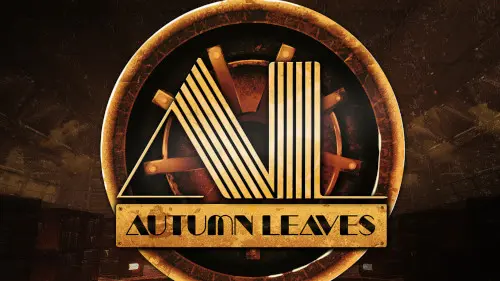
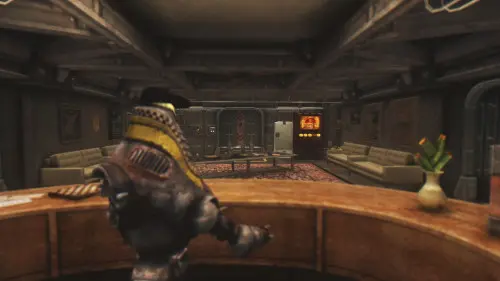
What inspired you to create such a branching narrative in the first place?
A lot of things, actually.
First of all, there was a sense of gratitude. When I decided to make Autumn Leaves, I had been nurtured with a lot of excellent game stories (Planescape: Torment, 9 Doors 9 Persons 9 Hours, Virtue's Last Reward, King of Dragon Pass, to name a few) and I felt the urge to... give the love back. I felt that it was my turn to come up with something.
But that wasn't all, there was also a bit of frustration involved: at the time, branching narratives hadn't yet made their big come back to the indie scene - nor in the triple-A scene, for that matter. I wanted to honour the genre and "pay my dues", somehow. Again, gratitude involved. So there I was, building up with some creative energy, ruminating ideas, rolling around but never crossing the line.
Then there was the trigger: it was an interview of Chris Avellone, who was still working at Obsidian at the time. In that interview, he was adamantly advocating for people to get their hands on modding tools and try to come with something on their own. He was citing modders who made it as a pro (Dave Oshry, if I'm correct) to support his claims. It was basically the nudge that made me fall on the other side.
I wanted to make something other players would play - and enjoy.
You have said that Autumn Leaves was key in getting you a job at Midgar Studio. How did all that come about?
It's the usual combo of luck and persistence. But also a bit of preparation. Keep in mind that the following is what worked for me, but my case is my case - and your case is your own. During the four years of Autumn Leaves' development, I managed its PR. Creating Tumblr & Twitter accounts, publishing my work as it went, making some jokes here and there. By interacting with people and making a lulzy or analytic post about my mod, I gathered some followers and built up awareness. It wasn't much in terms of numbers (1400 followers approximately) but I managed to get the interest of several accounts with a large number of followers: game journalists on Twitter and big Fallout fan accounts on Tumblr.
That was step one.
Step two was the release: reaching out to as many people as I could. Posting a Press Kit on Gamespress, sending e-mails to journalists (those with interest in mods or Fallout), and reaching the communities. ("Big" Tumblr accounts are really helpful. Tumblr people are - in general - overwhelmingly helpful.)
Step three was where the luck kicked in: I got a review page in the independent (and otherwise awesome) French magazine CanardPC. The review was rather dithyrambic. Aside from a morale boost, it would prove very useful a bit later.
Step three-and-a-half was going around indie game events, speaking to people, talking about their game, talking about my mod - learning how the indie scene works. There are probably indie gaming events in your vicinity - if you can bring yourself to go there, go! I got a small job for Sweet Arsenic by attending to some of these events.
Step four was almost a year after the release: the Gamescom was just around the corner, so I booked a ticket, listed all of the studios I could apply to, looked at their games and visited their booth, one-by-one, to see if they had any kind of narrative needs.
It's a bit of a pushy thing, so don't be persistent if you notice that the people you're speaking to are not receptive.
When I did my tour, I had two jokers in my pocket: I printed a page of positive comments written by you guys here on the Nexus (no matter how you put it, player's feedback and opinions are paramount in this industry) and a copy of the review in the French magazine CanardPC.
With both of these things, I got the attention of Jeremy, Midgar's Studio CEO, who made me pass a test (It's a good thing, that you suggest they make you pass a test - especially if you have only one project in your portfolio - which was my case.) I passed it - and this is how I'm working as a Narrative Designer today.
Since I'm a freelance, I did several small assignments for other studios - but the gist of it is: once you get there, it gets easier to stay there.
Edge of Eternity, the game you are working on, what can you tell us about that?
Yes, Edge of Eternity, Yes!
Edge of Eternity is an epic adventure with a tight narrative set in a sprawling open-world. It features a slick, fast and tactical combat - turn-based on a hexagonal grid. Yasunori Mitsuda (composer of Chrono Trigger, Xenogears and so many others) is participating to the score.
It's a love letter to old turn-based 90's JRPGs - without sticking *too* close to that formula. We're between paying tribute to what made the genre great while leaving aside what didn't age too well. We are also adding a good amount of things that would make the genre a bit richer.
One of these things, for instance, is the Nexus Grid: Nexuses represent a unity of terrain. They can contain basically anything: a group of enemies, heroes, hazards and even bonuses. On top of the already existing skills - traditional to most JRPGs: elemental spells, heals, etc. - each of the character of Edge of Eternity will possess their own unique set of skills that will address and exploit this Grid system.
One character just might lay out a minefield on a chosen Nexus while another - just biding it’s time for the right moment to jump into action - might savagely push, seize, throw, pin down or attract some enemies on that trapped Nexus.
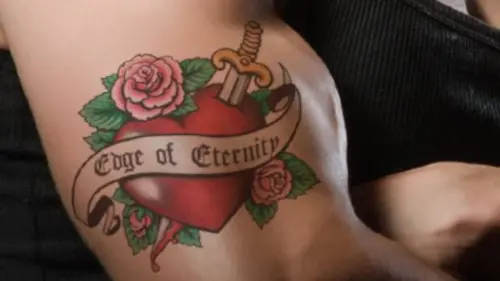
My current level of dedication to the project. (non-contractual image)
The idea behind this is to give the player new playthings, new possibilities. Most traditional JRPGs just give you the option to... grind until you're strong enough to face a boss. Here you will be able to customize your weapons with unique crystals, unlock special skillsets - and use the environment to triumph over your enemies.
One last example of this is that there is a direct translation between the map and the combat screen. So if for instance you see a minefield on the map and want to lure some enemies there to use the landmines against them during combat, you can.
The same kind of idea is also present within several sidequests and semi-procedural encounters: you will be able to make choices which will affect the outcome of the quest, the reward and even - in some cases - the environment.
As a Narrative Designer, what does your contribution to the game development process entail?
I'm both a writer and narrative designer, which basically anoints me as the "Holy Guardian of Everything Written Down In The Game." It goes from the lore - both what is shown and *not* shown during the game - as well as the dialogues, the quest design, the overarching scenarios, the personal story arcs, the environmental storytelling. Basically, anything that includes words.
That is not to say I'm Writer Almighty on Top of Thunderfeather Mountain - it's quite the contrary, actually. A video game remains a game above all. The gameplay must remain paramount to the experience - so I'm working closely with everyone in the studio to make sure that the player experience - and the gameplay - remains on top of everything.
One of my main go-to-guys is the Game Designer, for instance: I usually send him drafts for quests and wait for his commentary over what works within the frame of the game and what doesn't - then write the quests properly. Every quest has to be thought in its proper referential: the game itself. If a quest doesn't take advantage of the core gameplay, then it's probably not a good quest.
There also have been an occurrence when I refer to the composer (on how this scene and this music track can work together), animator, 3D Artist, etc. When a problem arises, we arrange a call and usually fix things quite quickly. In some case, I have to scrap some of the work I did because it simply doesn't fit in the gameplay, or level design or anything - but that's how it works.
As long as the consistency of the plot isn't threatened, it's far easier to rewrite something than to change an entire level's layout, actually.
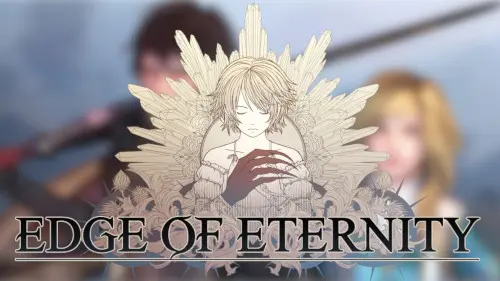
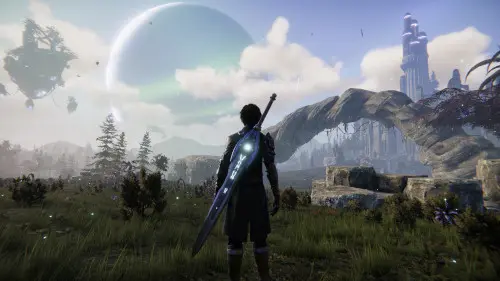
It’s great news that Edge of Eternity will support mods. You’re also releasing an SDK to help modders add to the game. Can you tell us more about modding in EoE?
We will be basically releasing the overwhelming majority of the tools we are using to develop the game in a toolset named "The Eternal Forge." As it is, it is somehow a mix between Unity (which it's an extension of), RPG Maker and Bethesda's Creation Kit.
You will be able to do everything with the game:
- Asset swap Entity Models, Weapons, Audio, FXs
- Create or alter entries in Edge of Eternity's databases (Actors, Items, Spells, Quests, Dialogues, Events, etc.)
- Create new maps or modify existing ones with Unity multi-scene system (And adding stuff like NPCs, events, cutscenes, dialogues, quests, rewards, etc.)
- Create your own standalone adventure by changing the beginning of the game to your custom map and completely create a different story with new actors, NPCs, etc.
- Coding in C# to extend the game in a limitless way (we just block access to a few critical functions that would endanger computers of the players, but otherwise there is no limit to what you will be able to do.)
If you want to throw all of Edge of Eternity through the window and create another world altogether, with its own setting, its own plot, its own characters and followers, its own items, skills... you can.
Actually, we just created a topic here on the Nexus forums, for everyone interested.
What kind of mods do you hope to see?
On a purely selfish point of view, mods that are very personal for their makers. I like to think that everybody has some kind of obsession, preferred themes, something only *they* as individuals can do - because it's *their thing*.
Everyone grows up with their own predisposition, their own preferences, their own visions. I often play mods not only to have a continuation of the original experience but to have access to "other people's world."
I have always seen modding as an invitation. People who make quests, dungeon or house mods are basically inviting other players into their home. "Here is how I see things, here is what I like." It's like entering another dimension, another space. It's a bit fascinating. I got this feeling the first time by playing an heavily-modded Morrowind. At first, I grumbled that everything wasn't respecting the canon, then I became very interested in visiting other people's turf.
I expect the same with Edge of Eternity. I hope they will make themselves at home in Heryon, and that they will do so in many unexpected ways.
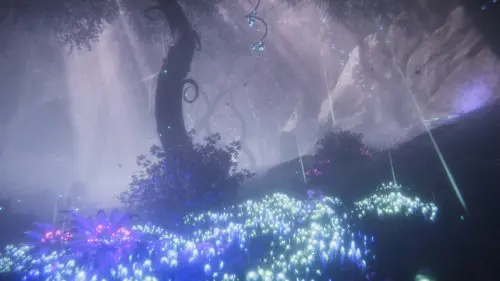
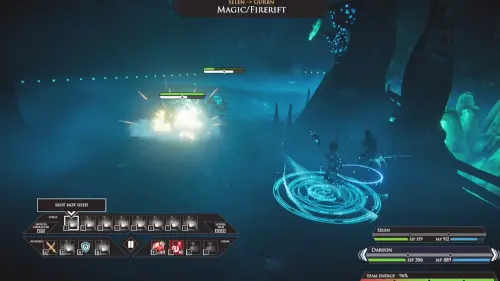
Do you have any advice for modders aspiring to get into the video game industry?
A lot, actually. The Modern Storyteller has already answered this question with good common sense (I advise you read it), so I'll try to provide answers that don't overlap with his.
- Keep cool. Your years of doing crappy jobs might still net you some of the maturity and experience needed to do your gamedev job. Learning how to coordinate yourself with others is very important - and you will need that to become a game developer. I learned to use Excel in one of my jobs and I couldn't have made Autumn Leaves without it.
- When you're modding, try your hands at several different things. As a narrative designer, it helped me greatly to have notions of level design or game design, because it helps me daily with interacting with other devs. Developing a game is teamwork - understanding each other's circumstances is vital.
- Not mandatory: making your mod as canon as possible to the base game is a rather nice move. As an artist (whether we're talking about music, models, prefabs, new items, etc.) staying consistent with the pre-existing world is the proof that you can work with a direction set by a Creative Director. It is very important. It's the proof that you're already a pro. For the narrative designer, writing everything to fit the canon, making sure that everything stays consistent with the world (ie: not pulling a lot of pools for people to publicly take a swim in a world plagued by drought, for instance) is your ticket to professionalism.
- Having something to show in your portfolio is really important. While it's easier for Visual Artists and Composer, it might be a tad harder for others. In that case, what I did was compiling nice comments about Autumn Leaves that I found on several different forums.
- Keep an ear out for feedbacks, no matter how trollish, or vague they may be. You don't have to satisfy everyone, though, but when people try to explain how they felt about your game or mod, you can generally trust them. Learning when to stick to your vision and when to admit you made a bad call is what will make you progress in the long run.
And one last thing that will help you get there: a community to help you, like the Nexus. If it wasn't for all of those people on the Nexus publishing tutorials on YouTube or answering questions on the forums, I wouldn't be where I am today. So, many kudos to them. In general, many kudos to a lot of people who helped me get there.
And kudos for the Nexus for simply - you know - being there.
Edge of Eternity is will be available in early access on Steam on 29th November 2018.
A big thank you to BaronVonCateau for taking the time to speak to us! If there's an author or mod project you'd like to know more about, send your suggestions to BigBizkit or Pickysaurus.






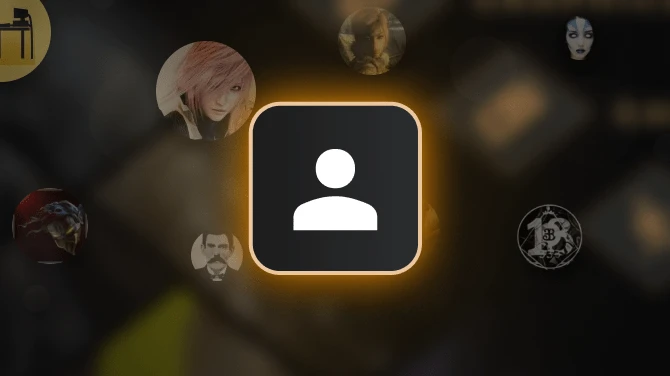
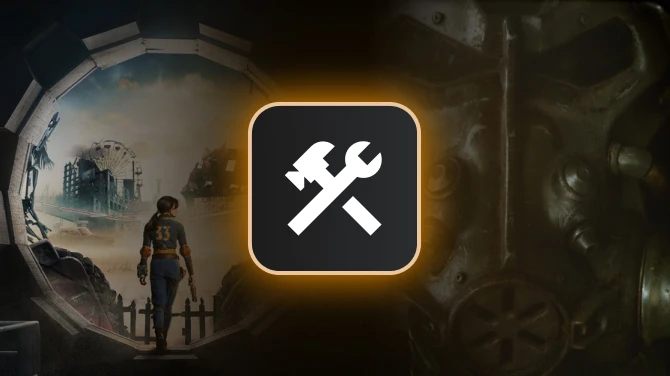

12 comments
Comments locked
A moderator has closed this comment topic for the time being(He's the guy who voiced the Maintenance Bot and Professor Cartwright (as well as the intro and outroS)
Also, the monsters appear on the world map and you can dodge them to avoid combat (instead of having a mandatory combat encounter)